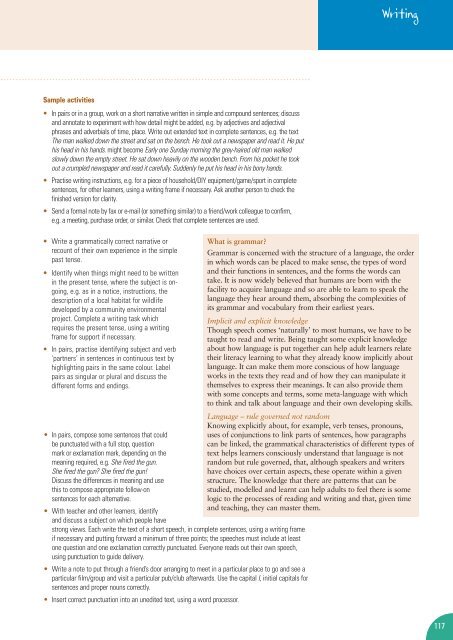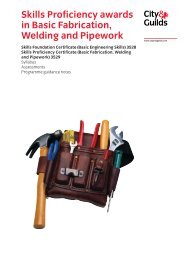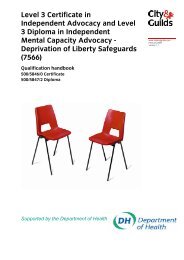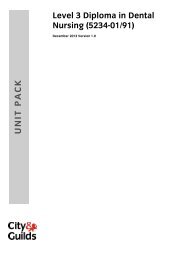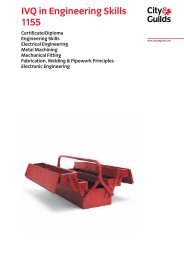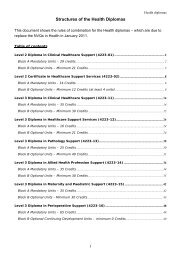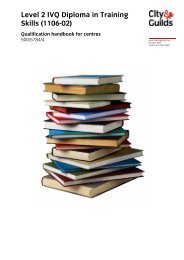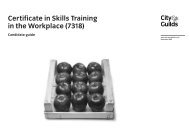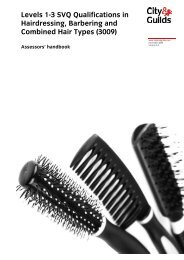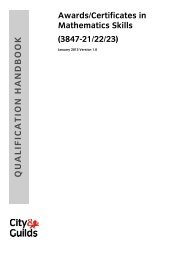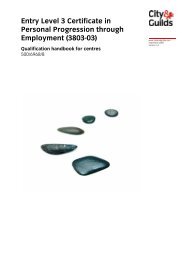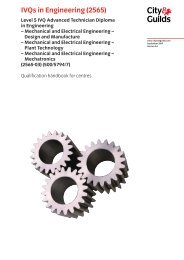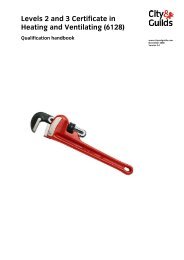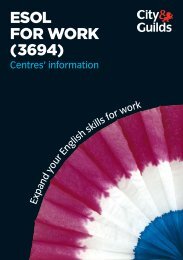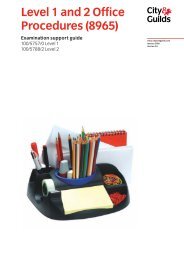Adult Literacy Core Curriculum - Nationally developed Skills for Life ...
Adult Literacy Core Curriculum - Nationally developed Skills for Life ...
Adult Literacy Core Curriculum - Nationally developed Skills for Life ...
You also want an ePaper? Increase the reach of your titles
YUMPU automatically turns print PDFs into web optimized ePapers that Google loves.
Sample activities<br />
• In pairs or in a group, work on a short narrative written in simple and compound sentences; discuss<br />
and annotate to experiment with how detail might be added, e.g. by adjectives and adjectival<br />
phrases and adverbials of time, place. Write out extended text in complete sentences, e.g. the text<br />
The man walked down the street and sat on the bench. He took out a newspaper and read it. He put<br />
his head in his hands. might become Early one Sunday morning the grey-haired old man walked<br />
slowly down the empty street. He sat down heavily on the wooden bench. From his pocket he took<br />
out a crumpled newspaper and read it carefully. Suddenly he put his head in his bony hands.<br />
• Practise writing instructions, e.g. <strong>for</strong> a piece of household/DIY equipment/game/sport in complete<br />
sentences, <strong>for</strong> other learners, using a writing frame if necessary. Ask another person to check the<br />
finished version <strong>for</strong> clarity.<br />
• Send a <strong>for</strong>mal note by fax or e-mail (or something similar) to a friend/work colleague to confirm,<br />
e.g. a meeting, purchase order, or similar. Check that complete sentences are used.<br />
• Write a grammatically correct narrative or<br />
recount of their own experience in the simple<br />
past tense.<br />
• Identify when things might need to be written<br />
in the present tense, where the subject is ongoing,<br />
e.g. as in a notice, instructions, the<br />
description of a local habitat <strong>for</strong> wildlife<br />
<strong>developed</strong> by a community environmental<br />
project. Complete a writing task which<br />
requires the present tense, using a writing<br />
frame <strong>for</strong> support if necessary.<br />
• In pairs, practise identifying subject and verb<br />
‘partners’ in sentences in continuous text by<br />
highlighting pairs in the same colour. Label<br />
pairs as singular or plural and discuss the<br />
different <strong>for</strong>ms and endings.<br />
• In pairs, compose some sentences that could<br />
be punctuated with a full stop, question<br />
mark or exclamation mark, depending on the<br />
meaning required, e.g. She fired the gun.<br />
She fired the gun? She fired the gun!<br />
Discuss the differences in meaning and use<br />
this to compose appropriate follow-on<br />
sentences <strong>for</strong> each alternative.<br />
• With teacher and other learners, identify<br />
and discuss a subject on which people have<br />
strong views. Each write the text of a short speech, in complete sentences, using a writing frame<br />
if necessary and putting <strong>for</strong>ward a minimum of three points; the speeches must include at least<br />
one question and one exclamation correctly punctuated. Everyone reads out their own speech,<br />
using punctuation to guide delivery.<br />
• Write a note to put through a friend’s door arranging to meet in a particular place to go and see a<br />
particular film/group and visit a particular pub/club afterwards. Use the capital I, initial capitals <strong>for</strong><br />
sentences and proper nouns correctly.<br />
• Insert correct punctuation into an unedited text, using a word processor.<br />
Writing<br />
What is grammar?<br />
Grammar is concerned with the structure of a language, the order<br />
in which words can be placed to make sense, the types of word<br />
and their functions in sentences, and the <strong>for</strong>ms the words can<br />
take. It is now widely believed that humans are born with the<br />
facility to acquire language and so are able to learn to speak the<br />
language they hear around them, absorbing the complexities of<br />
its grammar and vocabulary from their earliest years.<br />
Implicit and explicit knowledge<br />
Though speech comes ‘naturally’ to most humans, we have to be<br />
taught to read and write. Being taught some explicit knowledge<br />
about how language is put together can help adult learners relate<br />
their literacy learning to what they already know implicitly about<br />
language. It can make them more conscious of how language<br />
works in the texts they read and of how they can manipulate it<br />
themselves to express their meanings. It can also provide them<br />
with some concepts and terms, some meta-language with which<br />
to think and talk about language and their own developing skills.<br />
Language – rule governed not random<br />
Knowing explicitly about, <strong>for</strong> example, verb tenses, pronouns,<br />
uses of conjunctions to link parts of sentences, how paragraphs<br />
can be linked, the grammatical characteristics of different types of<br />
text helps learners consciously understand that language is not<br />
random but rule governed, that, although speakers and writers<br />
have choices over certain aspects, these operate within a given<br />
structure. The knowledge that there are patterns that can be<br />
studied, modelled and learnt can help adults to feel there is some<br />
logic to the processes of reading and writing and that, given time<br />
and teaching, they can master them.<br />
117


